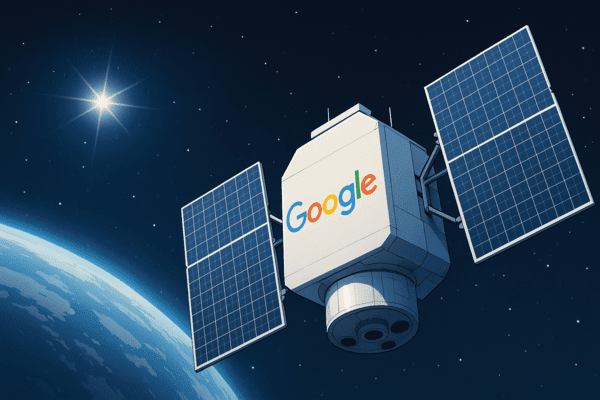AI power demand is skyrocketing — and Google believes the answer lies beyond Earth.
As the computational demand of artificial intelligence continues to soar, global data center energy consumption is now approaching the scale of national power generation. In response, Google has unveiled a bold plan to move part of its AI infrastructure into outer space.

A Solar-Powered “Space Data Center”
In a recently published paper, Google introduced its concept of a Solar-Powered Space Data Center. The company argues that the Earth’s limited energy resources will not be sufficient to sustain future AI workloads at scale.
TPU Satellites Forming a Low-Earth Orbit “AI Cluster”
Google plans to launch satellites equipped with its in-house Tensor Processing Units (TPUs) into low-Earth orbit (LEO), a region that receives sunlight for most of the year — up to eight times more solar energy than ground-based systems.
These satellites will interconnect through short-range wireless networks, functioning as a single massive computing cluster. In essence, distributed computing — the foundation of modern data centers — will be extended into space.
First Launch in 2027, Economic Viability by 2035
Partnering with private space company Planet Labs, Google plans to launch two test satellites carrying four TPUs each in 2027.
By 2035, improvements in rocket launch costs and system stability are expected to make the project commercially viable. Currently, the average launch cost is around $1,500 per kilogram, but Google projects it will drop to about $200 within a decade.
Radiation-Resistant Hardware — “Operable for Over Five Years”
In collaboration with researchers at UC Davis, Google conducted accelerator experiments to test whether TPUs could operate reliably in the harsh radiation environment of space.
Results showed the chips could function for at least five to six years. Communication tests between satellites achieved data transmission speeds of 1.6 Tbps.
“AI’s Power Crisis May Be Solved in Space”
Travis Bills, Head of Google AI Research, commented:
“If AI continues to evolve in ways that demand ever greater energy, space-based data centers could offer an incredibly scalable solution. Of course, like any bold innovation, success is not guaranteed.”
As the infrastructure of the AI era begins to expand beyond our planet, Google’s experiment offers a glimpse into a future where the boundaries of computing — and the search for sustainable power — extend into space itself.
By Tech Inside columnistㅣtlswnqor@naver.com
- Google Unveils New AI Chip “Ironwood,” Challenging NVIDIA’s Dominance
- Internet Founder Berners-Lee: “AI Could Shake the Ad-Based Web”
- AI Emerges as the “New Normal” in Cyberattacks... Google GTIG’s 2026 Security Outlook
- Google Integrates Gemini into Earth AI, Boosting Precision in Global Disaster Prediction
- [Tech Column] In the Post-Nuclear Era, Korea’s AI Survival Strategy Hinges on Power Supply
- Google’s Third Delay in High-Precision Map Export: Korea Draws the Line Against Data Imperialism
- Musk, Bezos, Google: The Race to Build AI Data Centers in Space Has Begun
- Can Google’s Gemini 3 Become the Plot Twist That Restores Its Lost AI Dominance?

![[동학] 카카오톡 친구탭, 결국 12월 롤백… “격자형 피드는 선택 옵션으로”](https://cdn.kmjournal.net/news/thumbnail/custom/20251126/5517_10550_1119_1763853080_120.jpg)


![[테크 칼럼] 제미나이3, GPT-5.1을 넘다…AI는 이제 ‘일을 대신하는 시대’로 간다](https://cdn.kmjournal.net/news/thumbnail/custom/20251126/5457_10454_4847_1763621329_120.jpg)



![[낭만 테크 시대] AI 대항해 시대](https://cdn.kmjournal.net/news/thumbnail/custom/20251126/5603_10714_4334_1764121414_160.jpg)

